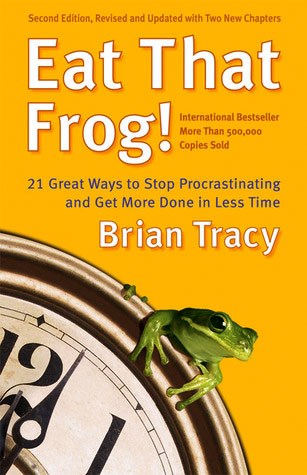It’s the middle of March. Did you feel your pulse quicken just a bit when you read that line? “March? Already? Where did the time go?”
Never fear. The following books will help you get organized and productive for the rest of the year.
Your brain is not reliable. David Allen’s name is almost synonymous with the word “productivity.” His system, described in his book Getting Things Done: The Art of Stress-free Productivity, starts with acknowledging that your brain just isn’t that good at remembering things. Let’s put all your to-dos, your appointments, your brilliant ideas and everything else down in one trustworthy place instead. For each item, we then figure out what the next action is with Allen’s handy flowchart. The key here is to break big, scary projects into small, actionable tasks. “Fix my car” is not the next action, “find the mechanic’s phone number” is. Each small action should move you towards completing your project in a less intimidating way.
“Priority” used to be a word that only came in the singular form. Now that you are ready to get things done, the next big question is what to do first. That’s where Essentialism: The Disciplined Pursuit of Less by Greg McKeown comes in. Central to this book is the idea “Less, but better.” The plethora of choices and societal pressures have made us into a “yes” machine — we accept every assignment and every invitation, we feel like we should be able to do it all but we can’t. Instead of being constantly disappointed with busy days running around responding to other people’s priorities, as an “essentialist,” you will make deliberate choices and thoughtful trade-offs to ensure you focus on what will make the biggest impact, then do only the things that only you can do.
A frog a day keeps procrastination away. Do you start your day checking your email or fiddling with papers on your desk? Brian Tracy’s Eat That Frog! 21 Great Ways to Stop Procrastinating and Get More Done in Less Time is a straightforward, down-to-Earth guide that urges his readers to make a habit of confronting the most important, but also the “hardest to swallow,” task first thing in the morning. You know which task I’m talking about: the one you have been avoiding for weeks that leads to all the stress and anxiety. Tracy provides simple guiding questions to help you clarify your goals and identify that biggest, ugliest frog that will have the biggest consequences on your work or family life. By the end of the book, you will be eager to ask yourself: Which frog will I be eating tomorrow morning?
“Workaholics aren’t heroes. They don’t save the day, they just use it up. The real hero is home because she figured out a faster way to get things done.” If you need daily inspiration, Jason Fried’s book Rework is a good one to keep close by. Even though this is essentially a book of advice for those starting or growing their business, the many nuggets of wisdom serve equally well to help you “restart” yourself. Fried rejects many of the preconceived notions we grew up with and suggests an alternative way of thinking and operating with real-life examples of success. Each point Fried makes is accompanied by a succinct illustration that you will want to enlarge, print out and stick to your wall.
Visit your local library for more productive reads.
A Good Read is a column by Tri-City librarians that is published on Wednesdays. Virginia McCreedy works at Port Moody Public Library.



